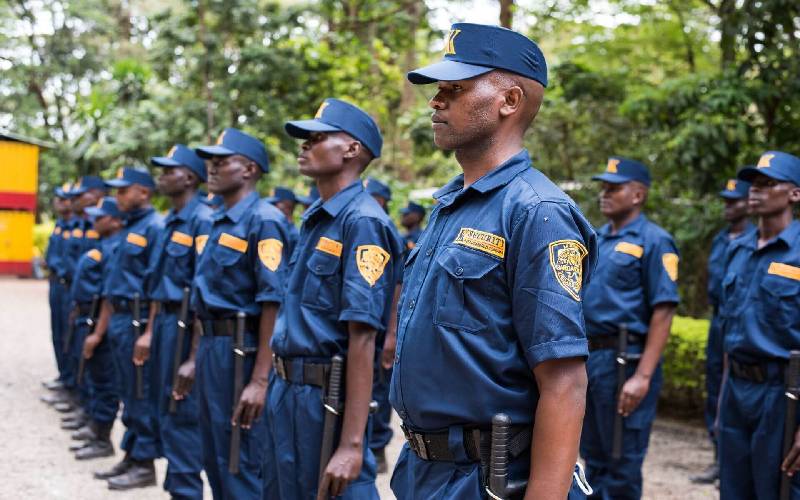Private security provision has a long history in Kenya, and companies like KK Security, Factory Guards (now Security Group) and Securicor have operated in the country since the 1960s.
The main expansion of the sector can be dated to the late 1980s and early 1990s, and private security continues to be one of the fastest growing sectors of the Kenyan economy
Kenya’s Private Security Regulatory Authority (PSRA) provides for a framework for cooperation between the private security companies and the national security organs.
High crime rates and the inability of public security services to provide adequate protection are the main factors driving the expansion of private security in Kenya.

The exact number of private security companies in Kenya is unknown; estimates vary from 400 to 2000, with an estimated 500,000 Kenyans serving in the industry.
The majority of companies operate in only one locality or town, whereas the major companies have operations in several main towns as well as rural areas. The highest concentration of companies is in Nairobi, where there may be as many as 500 companies.
In November 2019, the National Assembly moved a motion to annul the Private Security (General) Regulations, 2019 which have significant effects on the country’s private security guards.
2,500 companies
From January 5, 2020, the new rules in the Private Security (General) Regulations 2019, required that all the 2,500 companies that offer private security services to register with the Private Security Regulatory Authority (PSRA).
The new regulations also made it mandatory for individuals and companies seeking services of security guards to only engage with registered compliant firms, and those that fail to comply facing stiff penalties for violating the law.
Proposals contained in the stringent law include a new higher minimum wage for guards.
Although the private security industry in Kenya is increasingly recognised as playing an important role in fostering conditions conducive to development, investment and growth, the sector confronts a number of difficult challenges.
Operate in a highly armed environment
Private security companies are unarmed, but operate in a highly armed environment where criminal individuals and gangs have easy access to firearms.
A recent exposé by Citizen TV’s Purity Mwambia showed just how easy it is for thugs to hire guns.
The investigative feature showed how police officers allegedly hire out guns, police uniforms, bulletproof vests, and handcuffs to criminals and unlicensed members of the public.
Responding to the report, DCI Boss George Kinoti held a live broadcast to prove that the guns obtained and submitted by Citizen TV reporter did not belong to the National Police Service (NPS).
However, this does not negate the fact that Kenya’s private security officers often come up against well armed criminals in the line of duty.
Crime levels in Nairobi are far higher
Crime in Kenya, and particularly in the capital, has risen sharply in the last decade, to the extent that crime levels in Nairobi are now far higher than in comparable cities.
The main market for private security services is commercial clients, ranging from industries, banks, government agencies and commercial farms to embassies, international organisations, and refugee camps.
The leading companies offer a full range of services, including electronic intruder alarm systems, radio alarm response, perimeter protection and access control, guard dogs, satellite tracking, as well as in some cases fire and rescue services.
The cost of alarms and rapid response services in Nairobi currently stands at between Ksh 6,000 – Ksh 7,000, while the addition of a 24-hour guard service takes the total monthly cost to approximately Ksh 50,000.
There is also general agreement that the upper-end of the security market in Kenya is moving increasingly toward technological solutions, and that the future may well be increasingly dominated by alarmed response services rather than the traditional manned guarding

